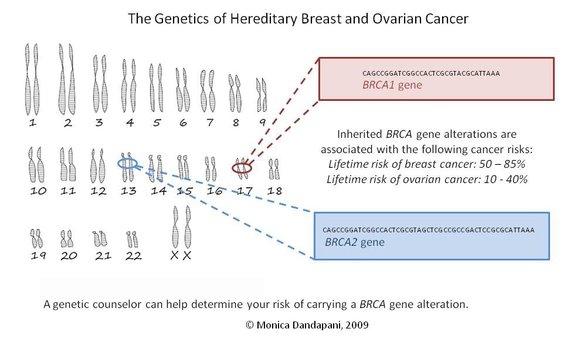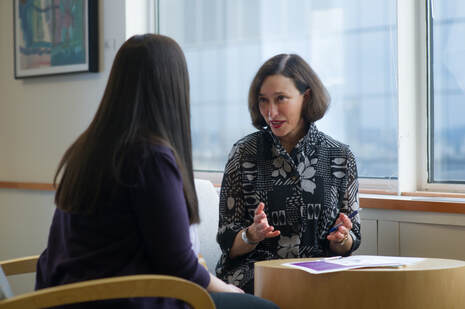HOME > CAREGIVERS > RESOURCES FOR FAMILY MEMBERS > GENETIC TESTING

The biggest risk factor for developing breast cancer at a young age is family history. This is especially true if a close relative (mother, father, sister, daughter) had it at a young age. Overall, about 15% to 20% of all breast cancers seem to have a family link.
Family history matters because your cells contain two sets of chromosomes (protein genes and DNA organized in a specific order). You inherit one set of 23 chromosomes from your mother and the other set from your father. Genetic factors that increase risk of certain diseases may be passed from generation to generation in this way. Two genes in particular increase your risk of breast and ovarian cancer if they mutate (change). These genes are called BRCA1 and BRCA2, and they are found on chromosomes 13 and 17, as shown in the image below. |
Related Pages
Coping: Cancer Impacts Everyone
(for caregivers) Expanding Your Circle of Support
(for caregivers) Genetics and Family History
(for patients) Understanding Your Diagnosis (for patients) |
Around 10% of young adults with breast cancer have an inherited BRCA1 or BRCA2 gene mutation. Certain BRCA1 and BRCA2 mutations can give a person a 50% to 85% chance of developing breast cancer in their lifetime, as well as a higher risk of ovarian cancer.
Adults more likely to carry a BRCA1 or BRCA2 mutation include those who:
- Are diagnosed with breast cancer at a young age
- Have a personal or family history of ovarian cancer
- Have had breast cancer in both breasts
- Are from certain ethnic backgrounds, such as Dutch or Ashkenazi Jewish ancestry.
This genetic information may be important to you and other members of your family. If your loved one with breast cancer has a genetic mutation, close blood relatives (mother, father, sisters, brothers, children) are at increased risk of having one, too. Talk with your doctor about whether or not genetic testing is right for you, and if so, when it should be done. You can also visit Dana-Farber’s Cancer Genetics and Prevention Program page or learn more at Dana-Farber's Center for BRCA and Related Genes.
External Resources
|
FORCE (Facing Our Risk of Cancer Empowered).
A national nonprofit organization devoted to hereditary breast and ovarian cancer. Provides support, education, and advocacy for people with a BRCA mutation or a family history of cancer. Services are available via a helpline and in person in many states and one UK location. |
MedlinePlus
Brought to you by the National Institute of Health’s National Library of Medicine. Provides consumer-friendly information about the effects of genetic variations on human health. |
©2020 Young and Strong Progam at Dana-Farber Cancer Institute




